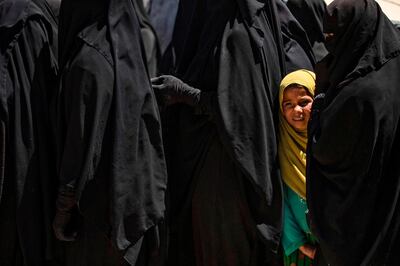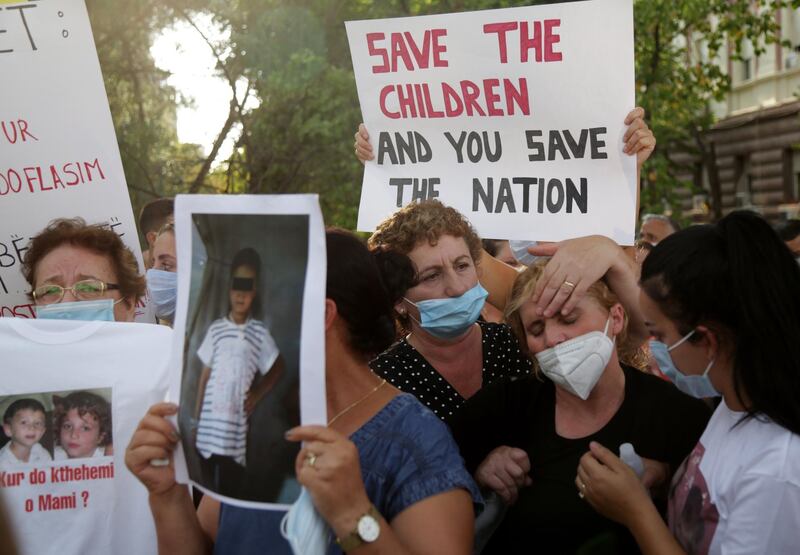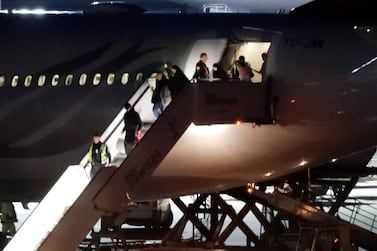A young British child who experienced the “worst horrors of war” in Syria has been taken back to the UK from a camp holding suspected ISIS extremists.
Foreign Secretary Dominic Raab announced the return of the child as part of a campaign to bring back unaccompanied or orphaned children from Syria.
Charity workers in the camps say there are about 60 British children among the 10,000 foreign youngsters in 11 camps in the former ISIS stronghold in Syria's north-east.
“These are children who have experienced the worst horrors of war and bringing them home is the right thing to do,” Mr Raab said.
Officials declined to give the child's details but the operation followed the return of three British orphans of ISIS-supporting parents in November last year.
Earlier reports suggested that plans to bring back dozens of British children were blocked after several ministers raised concerns that some posed a security risk.
“As I have said previously, we assess each case carefully,” Mr Raab tweeted.
Pleased we have been able to bring home a British child from Syria. As I have said previously, we assess each case carefully. Safely facilitating the return of orphans or unaccompanied British children, where possible, is the right thing to do.
— Dominic Raab (@DominicRaab) September 16, 2020
Save the Children said it had been involved in caring for the child in the camp but declined to give further details for legal reasons.
Amjad Yamin, the charity’s advocacy director, said that Covid-19 had added to a crisis in the camps, leading to a rise in malnutrition and hunger among children.
“The conditions are not fit for children to continue to live in across the north-east camps,” Mr Yamin said.

Families were not able to feed children fresh food and their ability to buy supplies had been hit by the continuing conflict and economic downturn.
“These children have suffered more from ISIS than anyone in the world and have seen some awful things,” Mr Yamin said.
“The only thing we can do is to bring them back so society can look after them.
"The only viable solution at the moment is to be rehabilitated and reintegrated.”
The fate of British citizens languishing in north-east Syria, parts of which came under the control of a Kurdish-run administration after the defeat of ISIS, has been deeply contentious in the UK.
UK authorities have stripped many accused ISIS members of their citizenship in a move criticised by activists.
One of the most high-profile travellers, Shamima Begum, is in a legal battle with the UK government over the withdrawal of her British passport.
Ms Begum, now 20, travelled to Syria in 2015 as a schoolgirl with two friends.
She married a Dutch member of ISIS and had three children, all of whom died. She remains in a Syrian camp pending the outcome of the case.
Children taken back to the UK are placed in the care system and given anonymity as part of efforts to rehabilitate them.
In the UK, more than 150 children have been taken from their parents since 2013 because of fears of radicalisation, Parliament was told last year.
The former Middle East Minister, Andrew Murrison, confirmed that many would be taken into the care of extended family and foster carers, or adopted, with special support put in place.
They included two children, aged 2 and 3, who were born in Syria.
Their parents met after travelling separately to Syria in about 2014.
The family returned to the UK after being held in an immigration detention camp in Turkey but the children were separated from them and put into foster care, court papers show.
A UN-backed team monitoring abuses in Syria criticised the failure of foreign countries to repatriate women and children held in the overcrowded camps.
The UN Commission of Inquiry on Syria said that tens of thousands of women and children had been confined in Al Hol camp since early 2019.
It said that at least 75 unaccompanied foreign children from unspecified countries being held at Al Hol and Al Roj camps were particularly vulnerable.
The commission said medical services had been stripped to “skeletal” levels because of Covid-19.








